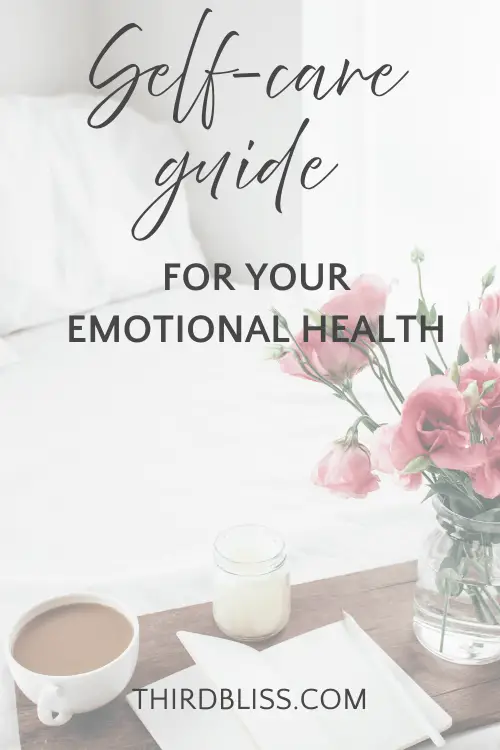SELF-CARE GUIDE: IMPORTANT TIPS TO KNOW
The following self-care guide will cover why it’s important for your emotional health and tips you can use to recharge and reduce stress everyday. When it comes to self-care, you’re probably thinking of getting regular exercise, eating more veggies, sleeping 8 hours a day, or going to the spa on the weekends.
While these are all great practices, self-care should also include your emotional health, because your overall well-being is affected when you are not balanced. Self-care is not being selfish. In fact, it is the best thing that you can do for yourself, especially if you are a parent or a caregiver.
Self-care is not indulgence, it's recharging yourself so you can be your best self.

What is basic self-care?
Basic self-care is satisfying your fundamental needs such as sleeping enough, eating 3 meals a day, and having enough personal time to pursue and entertain your interests. This prevents you from burning out and wallowing a negative mental and emotional state.
What are the 7 categories of self-care?
According to the Wheel of Wellness model, there are 7 categories of wellness, which are emotional, physical, intellectual, financial, social, environmental and spiritual. Each category is very important, but we’ll focus on emotional health in this self-care guide.
I used to think physical self-care was enough. As long as I wasn’t starving or sleep deprived, I thought everything in my life would be okay. What I didn’t know was each category of wellness is interconnected to the rest in a delicate balance. When I neglected my emotional and mental areas, my physical and spiritual health suffered, too.
What are examples of self-care?
When it comes to self-care, you don’t just want to do enough to get by or avoid adversity, you want to thrive, become resilient and learn to cultivate feelings of self-love and compassion.
Here are some examples of self-care:
Practice gratitude to feel more abundant.
Accept yourself completely and your current situation.
Embrace all your emotions, even the unpleasant ones.
Let go of things you can’t control.
Feel the freedom of surrendering to the present moment.
Think and say kind things to yourself.
Why emotional health is as important as your physical health.
Your emotional health is as important as your physical health because they can affect one another. Studies have shown that emotional distress and depression were independent risk factors for certain types of diseases and gastrointestinal disorders.
On the flip side, the studies also suggested that being diagnosed with a serious disease often led to depression. There was also a link between worsening physical symptoms and increased depression.
Life can sometimes feel like an emotional roller coaster ride. So care for your feelings on a regular basis to prevent them from affecting your physical health. Also, talk to someone or seek professional help when you feel like you need more than a self-care guide.
Why is emotional self-care so important?
Caring for yourself first, means accepting your own limitations and setting boundaries, so that your cup can overflow instead of being almost empty. If you don’t get enough rest or are constantly caring for others and neglecting yourself, your energy will be spent. When you don’t have enough energy left for yourself, you run the risk of feeling resentment, guilt, anxiety or even depression.
How can self-care enhance your emotional health?
Self-care can help enhance your emotional health by mitigating stress and preventing burnout. Self-care practices can also help you to recharge so you have energy to put your best self forward, especially if you are helping others.
In one study, a group of physicians were given mindfulness-based interventions for their emotional support and well-being to prevent burnout and compassion fatigue in their profession. The results revealed an overall positive effect on their physical and psychological health.
How do you nourish yourself emotionally?
Caring for your emotions might seem overwhelming, but it doesn’t have to be. Use this simple, self-care guide to help you nourish yourself emotionally everyday.
10 SELF-CARE PRACTICES FOR YOUR EMOTIONAL HEALTH
-
Meditate
Meditation is not about emptying your mind, but rather, becoming aware of your thoughts and emotions as they come up. The benefits of meditation have been studied and are undoubtedly great for your health. It helps to reduce stress and may lead to a more optimistic outlook on life.
You don’t have to meditate for hours either. If you only did it for 5 minutes everyday, you’ll be able to reap the health benefits.
-
Practice gratitude
Being thankful opens the way to greater abundance. You appreciate what you have instead of focusing on what you don’t have. And you realize what is most important to you in life.
You can start with a gratitude journal and write just 1 thing everyday that you’re grateful for. After a few weeks, you can look at what you wrote and reflect on what it is you're grateful for. Notice the feelings that surface and as you reflect and continue your daily gratitude practice.
-
Mindfulness practices
Mindfulness is about bringing your awareness to the present moment without judgement. The wonderful thing about mindfulness practices is you don’t need to set aside time to do them.
You can incorportate them into your daily life as part of your self-care routine. Some examples are eating a raisin meditation, walking meditation, 5-minute breating meditation, and nature meditation.
Helpful article: What is mindfulness and what are the benefits?
-
Positive self-affirmations
Self-affirmations are your thoughts or what you say to yourself to boost your self-esteem. It is a wonderful practice that can help to rewire your brain to increase self-confidence.
You can start with saying 3 kind things to yourself everyday. It may feel strange at first, but over time, your mind will adapt. Your self-worth will increase and you will be able to regulate your emotions with greater ease.
-
Forgiving and letting go
Forgiveness and letting go are also ways to care for yourself emotionally. Forgiveness is the ability to let go of old anger and resentment. It is not about reconciling with the person who hurt you or condoning what they did to you.
Letting go of past hurts and traumas can help heal your spirit so they don’t stay trapped in your body. Start by forgiving something small. Then work your way up to forgiving bigger past traumas. It takes time to forgive completely, so take your time and go slow.
-
Say no and set boundaries
Saying yes when you really mean no, can create bitterness and tension inside of you. It can be difficult to say no, when you don’t want to upset or disappoint the other person. However, when you feel obligated to do something, you are not being authentic to yourself and you're not really giving the other person your best self.
Self-care is about setting up healthy boundaries, which can bolster your emotions. Although it may not feel like it at first, saying no to someone else is saying yes to yourself.
-
Get to know yourself
Caring for yourself means taking the time to get to know who you truly are. This takes honesty and some soul searching. Getting to know yourself is good for your emotional health.
You get very clear on what you really want and how you want to achieve your goals in life. You'll make decisions that are meaningful and authentic to you.
-
Be kind to yourself
Being kind to yourself takes intention, action, repetition and a bit of courage. Have you ever stopped to pay attention to what you're thinking or saying to yourself? If you're like most people, they're probably mostly negative things about yourself.
Be intentional and come up with 3 kind things to say to yourself everyday. Just like self-affirmations, you'll want to practice regularly to boost your emotional health.
-
Find your tribe
Self-care is surrounding yourself with people who are supportive of you. These are people who will listen to you when you need to vent or celebrate with you when something good happens to you in your life.
This also means taking a look at who in your life is toxic and limiting your exposure to them or cutting them out of your life entirely. Toxic people can only bring negative energy to your life, negating any self-care practices that support your emotional health.
-
Get help
Self-care is knowing when to ask for help. It doesn’t mean that you’re weak. It means that you have the courage to show your vulnerability. People are always willing to help others. So don’t hesitate to get help from a friend or professional when you need a shoulder to lean on.
Learning to care for yourself is not some innate characteristic. It is a culmination of skills that you must hone everyday. You don’t have to carve out a lot of time during your day either. A simple expression of gratitude, kindness, mindfulness, affirmation, and supportive environment will go a long way.
I hope you found this self-care guide helpful. Let me know if you have any questions, comments or feedback!


